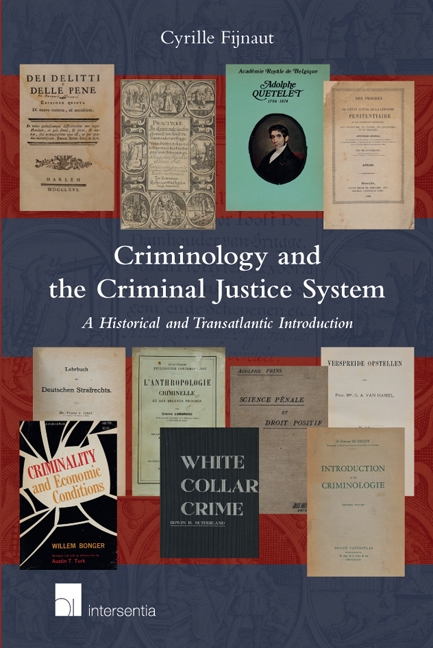Book contents
- Frontmatter
- Preface
- Contents
- Chapter 1 General Introduction
- Chapter 2 Origin of the Present-Day Criminal Justice System
- Chapter 3 Restructuring of the Criminal Justice System During the Enlightenment and the French Period
- Chapter 4 Emergence of the Scientific Study of Crime, Criminals, and the Combatting of Crime
- Chapter 5 Establishment of Criminology in Italy and France
- Chapter 6 Development of Criminology in German-Speaking Europe and the United Kingdom
- Chapter 7 Establishment of Criminology in the Netherlands and Belgium
- Chapter 8 Ideologisation of Criminology in the Third Reich and the Soviet Union
- Chapter 9 Reception of European Criminology in the United States
- Chapter 10 Transatlantic Integration of Criminology
- Chapter 11 General Conclusion
- Bibliography
- Register of Names
Chapter 6 - Development of Criminology in German-Speaking Europe and the United Kingdom
Published online by Cambridge University Press: 11 October 2018
- Frontmatter
- Preface
- Contents
- Chapter 1 General Introduction
- Chapter 2 Origin of the Present-Day Criminal Justice System
- Chapter 3 Restructuring of the Criminal Justice System During the Enlightenment and the French Period
- Chapter 4 Emergence of the Scientific Study of Crime, Criminals, and the Combatting of Crime
- Chapter 5 Establishment of Criminology in Italy and France
- Chapter 6 Development of Criminology in German-Speaking Europe and the United Kingdom
- Chapter 7 Establishment of Criminology in the Netherlands and Belgium
- Chapter 8 Ideologisation of Criminology in the Third Reich and the Soviet Union
- Chapter 9 Reception of European Criminology in the United States
- Chapter 10 Transatlantic Integration of Criminology
- Chapter 11 General Conclusion
- Bibliography
- Register of Names
Summary
INTRODUCTION
How Italian and French criminology were received elsewhere in Europe diff ered greatly from one country to another. In Germany, the Italian School, and particularly Lombroso, gained a considerable following thanks to the “missionary work” of a number of its protagonists. In the United Kingdom, opinions on the significance of Lombrosian criminology were more divided. This is apparent from the fact that at the beginning of the twentieth century a detailed study was initiated by Charles Goring of the validity of the views proclaimed by Lombroso in the context of that school regarding the born criminal. In Germany, there was no question of any such study. In both countries, hardly any attention was paid to the ideas promulgated in the context of the French School, with Lacassagne and also Tarde and Durkheim being ignored. In neither country did they play any recognisable role in public or academic debate on crime and the criminal justice system.
It is important to note that the development of criminology in Germany in around 1900 cannot be viewed in isolation from its development in the other main German-speaking countries, namely Austria and Switzerland. The developments in these countries are in fact very closely linked and will therefore be discussed in relation to one another. That said, it can also be noted that the development of criminology in these three countries – like its rise in Italy and France – was closely linked to major figures who carried out pioneering work. Those figures were, in particular: Franz von Liszt, a professor of criminal law, who, on his appointment at the University of Marburg in 1882, made an impassioned plea for the integration of criminology into the study of criminal law; Hans Kurella, who around the turn of the century was a tireless advocate of Lombroso and his criminal anthropology; Gustav Aschaff enburg, a psychiatrist who published a book in 1903 – Das Verbrechen und seine Bek a mpfung [Crime and its Repression] – that gave him the same leading role in German-speaking Europe as Lombroso had in Italy and Lacassagne in France; and finally Hans Gross, a magistrate and later professor in Graz, who in the 1890s positioned himself with several large-scale studies as the founder of both modern criminal psychology and modern criminalistics.
- Type
- Chapter
- Information
- Criminology and the Criminal Justice SystemA Historical and Transatlantic Introduction, pp. 193 - 258Publisher: IntersentiaPrint publication year: 2017



